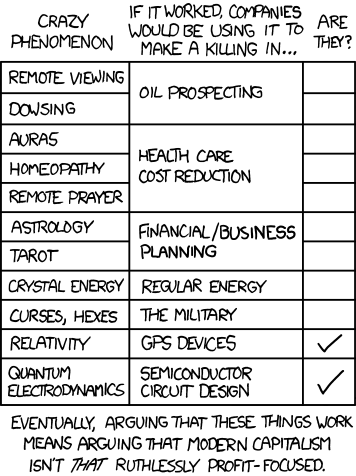 Caption: The U.S.S. North Carolina, the lead battleship of her class, being fitted out at the Brooklyn Navy Yard, in April, 1941. This vessel, along with hundreds of other warships, cargo vessels, and their equipment and supplies are among the many reasons that the United States' economy recovered at the start of World War II.
Caption: The U.S.S. North Carolina, the lead battleship of her class, being fitted out at the Brooklyn Navy Yard, in April, 1941. This vessel, along with hundreds of other warships, cargo vessels, and their equipment and supplies are among the many reasons that the United States' economy recovered at the start of World War II.Image credit: U.S. Navy/Wikimedia
If this weren't David Broder writing this, I'd be thinking it was some form of satire:
What else might affect the economy? The answer is obvious, but its implications are frightening. War and peace influence the economy.I don't know what's more disturbing about this editorial, that it's obvious warmongering for the sake of economic and political gain, or that Broder has absolutely no understanding of what made World War II so prosperous for the U.S.
Look back at FDR and the Great Depression. What finally resolved that economic crisis? World War II.
Here is where Obama is likely to prevail. With strong Republican support in Congress for challenging Iran's ambition to become a nuclear power, he can spend much of 2011 and 2012 orchestrating a showdown with the mullahs. This will help him politically because the opposition party will be urging him on. And as tensions rise and we accelerate preparations for war, the economy will improve.
The War Recovery?
The first concern is an obvious one, I think, because anyone who has ever examined how WWII went realizes that it wasn't a good time for the economies of Great Britain, Germany, Japan, or the Soviet Union. It was catastrophic for Germany and Japan, and to some degree both the United Kingdom and Russia are still recovering. All of them lost most of a generation of young men, and quite a few cities and civilian casualties. War doesn't always go well for its participants.
Caption: B-24 bombers being built for WWII in a plant built for WWII production, which was one of the largest in the world at the time. Perhaps nothing symbolizes the economic effort of WWII more than pictures like this one.
Image credit: U.S. Air Force/Wikimedia
The second concern is only slightly more subtle, really. The United States profited from the war by producing war machinery on an unprecedented scale. Between 1938 and 1942 we laid down twenty aircraft carriers, a dozen battleships, and scores of escort ships. We built hundreds of auxiliary and cargo ships. We built factories that built a hundred thousand aircraft, and countless tanks and military vehicles, not to mention the guns they carried and the ammunition they used. Not only did we outfit our own armed forces with this equipment, making them the strongest and largest in the world at the time, but we also helped supply a number of our allies with aircraft and military vehicles. We weren't called the Arsenal of Democracy for nothing.
Nothing even remotely like that kind of war production will be needed in a battle with Iran.
People like David Broder, who are neither inclined nor forced to understand the issues they pontificate about, are dangerous when they are given a megaphone by the news organizations of this country. Unfortunately, they seem to be the rule rather than the exception, at least in DC.












